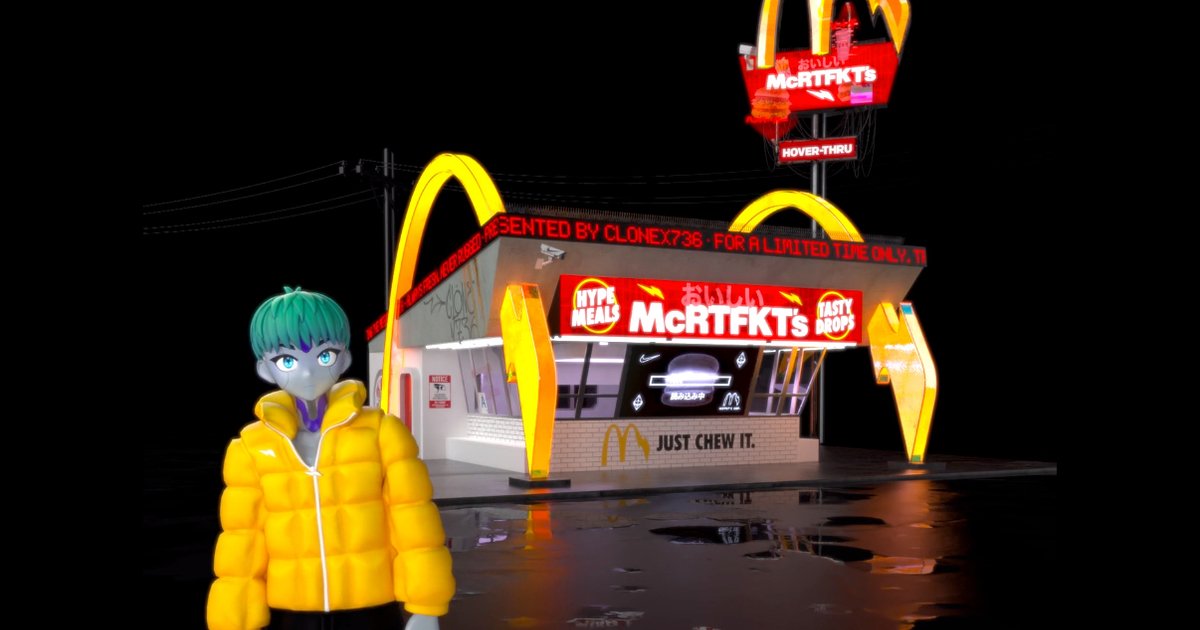Forgot Password?
Once registered, you can:
By registering you agree to our privacy policy, terms & conditions and to receive occasional emails from Ad Age. You may unsubscribe at any time.
Are you a print subscriber? Activate your account.
By Garett Sloane – 10 hours 49 min ago
By Ad Age and Creativity Staff – 13 hours 3 min ago
By Maia Vines – 13 hours 24 min ago
By Parker Herren – 16 hours 47 min ago
By Jack Neff – 18 hours 47 min ago
By Ann-Christine Diaz – 3 days 16 hours ago
By Bradley Johnson – 1 week 4 days ago
By Adrianne Pasquarelli – 20 hours 47 min ago
By E.J. Schultz – 18 hours 47 min ago
By Asa Hiken – 21 hours 47 min ago
By Ann-Christine Diaz – 21 hours 32 min ago
By Ad Age Staff – 21 hours 47 min ago
By Jack Neff – 18 hours 47 min ago
A McDonald’s-themed restaurant may or may not be coming to the metaverse, depending on who you ask.
The concept is called McRTFKT’s (pronounced McArtifact’s), and is being billed on its website as “the metaverse’s first QSR virtual franchise.” To be clear, the restaurant will not be serving actual food, but rather NFTs that take inspiration from McDonald’s fast food items, such as a “Double McMurakami” burger and a “10-piece Pigeon McNuggets” meal. Each limited-quantity token can be acquired on NFT marketplace OpenSea for free, plus gas fees.
A restaurant in a virtual space is not a novel idea, as demonstrated in the past year by brands including Chipotle and Wendy’s. But the key difference with McRTFKT’s is that McDonald’s has nothing to do with it, despite the real chain’s IP existing in partial form on nearly every piece of the fake chain’s digital merchandise. NFT company RTFKT, which is owned by Nike and accounts for the other half of the name, also has no affiliation.
This may come as a surprise considering how plainly McRTFKT’s is implying a connection to the firms—even its logo is a portmanteau of the Golden Arches and RTFKT’s swoosh-like insignia.
Tyler Cohen, a creative director who devised the virtual space, said that brands’ presence in the metaverse has hitherto been lacking, and he wanted to provide a blueprint for how to more effectively show up in Web3.
“There is such an underwhelming amount of really bad activations within this quote-unquote metaverse,” Cohen told Ad Age. “These are established brands—this [McRTFKT’s] is how they can make their entry.”
McDonald’s, RTFKT and Nike did not return requests for comment.
Some of the McDonald’s-themed NFTs offered by McRTFKT’s.
Cohen’s restaurant primarily aims to spice up the minting process of NFTs. As opposed to the typical method, which entails waiting in a queue on a basic website until a token is generated, consumers will enter a virtual restaurant, customize their NFTs as if ordering a meal and then pick it up at the “hover-thru”—the experience’s take on a drive-thru. Cohen is currently building the activation on the 3D game engine PlayCanvas.
The concept was born out of Cohen’s own participation in the NFT community CloneX, a popular collection created by RTFKT. Cohen holds a special Clone whose humanoid character contains a trait—a “job tee” shirt—that is possessed by only 0.8% of all Clones. The shirt looks curiously similar to a McDonald’s uniform, which is in part how he came up with the idea for the QSR restaurant.
The design of the “job tee” shirt trait belonging to Cohen’s CloneX NFT.
More importantly, though, McDonald’s maintains one of the most recognizable iconographies of any brand in the world, making it ripe for potential in the Web3 space, according to Cohen. The same goes for Nike, which by some accounts has already topped the NFT leaderboard thanks to its acquisition of RTFKT. Cohen thinks it can find even more success by embracing the creative interests of Web3 consumers.
“They’re built differently than your Web2 audience,” Cohen said. “These are people that are actively looking to participate in a brand. It is a huge paradigm shift.”
Despite Cohen’s intentions in the virtual world, his restaurant may have legal problems in the real world. McDonald’s and Nike could feasibly attempt to have the website taken down and halt all work on the project if they take issue with Cohen’s use of their IP. Neither brand has yet reached out to Cohen, he said.
According to Michelle Cooke, a partner at law firm ArentFox Schiff, McDonald’s and Nike may be particularly sensitive about their IP being used by the virtual restaurant since they have already shown an interest in Web3 spaces.
“The question will be whether something like this hinders their ability to shape the narrative of what their brand is and what partnerships they might want to drive creatively in the metaverse,” she said.
What could help Cohen’s case, however, is the concept’s presentation as a “transformative work of art,” meaning its assets amalgamate, or transform, pre-established IP into new, original IP. Cohen, who received legal consultation, also will not profit through the NFTs nor earn any kind of commission, since they are being offered for free. To drive home this narrative, he is sharing ownership of the restaurant with all of the other holders of Clone NFTs that possess the “job tee” trait. An added benefit of this, said Cohen, is that it could drive up the value of these specific NFTs if the restaurant works as planned.
McRTFKT’s raises another important point about copyright, for which brands marketing with NFTs must be increasingly prepared. Just as a brand will need to decide what blockchain their NFT will use or how much it will cost, they need to consider the rights that the buyer will have over the NFT’s IP. Will the brand retain full ownership? Will owners be able to license their NFT’s specific imagery? Or will anyone have free rein over all parts of the collection, as shown by collections with Creative Commons-based models like Nouns?
Amid ongoing IP infringement on NFT platforms like OpenSea, brands should aim to answer these questions sooner rather than later. Emerging brands like Bored Ape Yacht Club have already needed to contend with such as users try to license their NFTs for everything from tech accessories to real-world fast food restaurants.
As for CloneX, Cohen said the rights of NFT owners have changed over time, especially after Nike’s acquisition of RTFKT. There has, however, been evidence of hope that Cohen is in the clear: Both RTFTK’s co-founder and chief technology officer showed support on Twitter for the virtual QSR.
In this article:
Asa Hiken is a technology reporter covering digital marketing, social media platforms and innovation. A graduate of Northwestern University, he joined Ad Age after writing for Marketing Dive, where he focused on the alcohol space and digital privacy.


